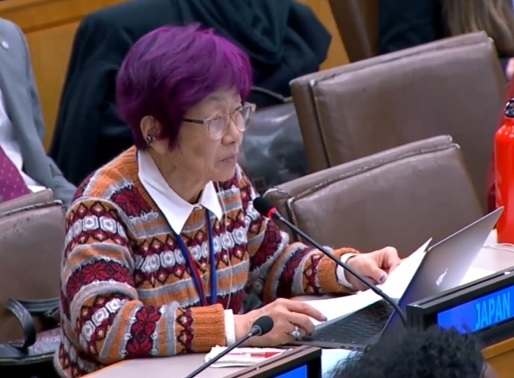第79回国連総会第3委員会議題67「児童の権利」に関する紙谷政府代表顧問ステートメント
令和6年10月10日

(As delivered)
Madam Chair,
As we commemorate the 30th anniversary of the ratification of the Convention on the Rights of the Child, and in light of the recently adopted Pact for the Future, which includes both a Global Digital Compact and a Declaration on Future Generations, I would like to begin by reaffirming Japan’s unwavering commitment to the protection and promotion of the rights of the child.
Madam Chair,
Allow me to first highlight Japan’s domestic efforts to safeguard and advance the rights of the child.
First, in April 2023, Japan established the Children and Families Agency, dedicated to championing the rights and interests of the child. Guided by the Basic Act on Children’s Policy, the Agency actively promotes policies that prioritize the views of children, youth, and people raising children.
Second, Japan continues to make strides in ensuring a safer learning environment for children. In June this year, the Japanese government enacted legislation to prevent recurring sexual crimes against children, obligating educators and childcare providers to take measures to ensure child safety against sexual crimes, including to check whether their employees have a record of sexual crimes. This will strengthen protection for children, by preventing individuals with records of sexual crimes from working in relevant educational and childcare settings.
Third, in May, Japan amended the Family Law from the perspective of ensuring the best interests of children regarding parental responsibility, custody, child support, and parent-child visitation. This amendment enables children to retain a parent-child bond with both parents after divorce, which helps mitigate the potential psychological impact of divorce on children.
Madam Chair,
Japan is also dedicated to ensuring the protection of the rights of all children globally, with particular attention to those in vulnerable circumstances. Japan firmly believes that education serves as a cornerstone for lasting peace and therefore places high priority on ensuring educational access to children affected by conflict and humanitarian emergencies.
In pursuit of this goal, Japan has partnered with UNESCO, UNICEF, and WFP to support the restoration of educational infrastructure, implement school feeding programs, and enhance digital educational resources to foster a more equitable future for children facing challenging circumstances.
Furthermore, it is equally important for Japan to support parents, guardians, and educational personnel to better protect the rights of the children globally. From this viewpoint, Japan has supported the program promoting positive parenting to reduce violence against children in five sub-Saharan African countries, which have been affected by the COVID-19 pandemic, conflict, and climate crises.
Madam Chair,
In closing, I wish to reiterate Japan’s renewed commitment to fostering a safe space where children can thrive free from fear, both within Japan and across the globe, in partnership with the international community and civil society.
I thank you.
As we commemorate the 30th anniversary of the ratification of the Convention on the Rights of the Child, and in light of the recently adopted Pact for the Future, which includes both a Global Digital Compact and a Declaration on Future Generations, I would like to begin by reaffirming Japan’s unwavering commitment to the protection and promotion of the rights of the child.
Madam Chair,
Allow me to first highlight Japan’s domestic efforts to safeguard and advance the rights of the child.
First, in April 2023, Japan established the Children and Families Agency, dedicated to championing the rights and interests of the child. Guided by the Basic Act on Children’s Policy, the Agency actively promotes policies that prioritize the views of children, youth, and people raising children.
Second, Japan continues to make strides in ensuring a safer learning environment for children. In June this year, the Japanese government enacted legislation to prevent recurring sexual crimes against children, obligating educators and childcare providers to take measures to ensure child safety against sexual crimes, including to check whether their employees have a record of sexual crimes. This will strengthen protection for children, by preventing individuals with records of sexual crimes from working in relevant educational and childcare settings.
Third, in May, Japan amended the Family Law from the perspective of ensuring the best interests of children regarding parental responsibility, custody, child support, and parent-child visitation. This amendment enables children to retain a parent-child bond with both parents after divorce, which helps mitigate the potential psychological impact of divorce on children.
Madam Chair,
Japan is also dedicated to ensuring the protection of the rights of all children globally, with particular attention to those in vulnerable circumstances. Japan firmly believes that education serves as a cornerstone for lasting peace and therefore places high priority on ensuring educational access to children affected by conflict and humanitarian emergencies.
In pursuit of this goal, Japan has partnered with UNESCO, UNICEF, and WFP to support the restoration of educational infrastructure, implement school feeding programs, and enhance digital educational resources to foster a more equitable future for children facing challenging circumstances.
Furthermore, it is equally important for Japan to support parents, guardians, and educational personnel to better protect the rights of the children globally. From this viewpoint, Japan has supported the program promoting positive parenting to reduce violence against children in five sub-Saharan African countries, which have been affected by the COVID-19 pandemic, conflict, and climate crises.
Madam Chair,
In closing, I wish to reiterate Japan’s renewed commitment to fostering a safe space where children can thrive free from fear, both within Japan and across the globe, in partnership with the international community and civil society.
I thank you.
